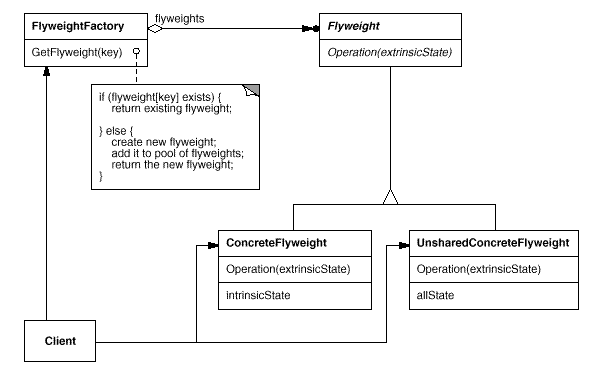- Intent: Use sharing to support large numbers of fine-grained objects efficiently.
Structure §

Image from: Gamma, Helm, Johnson, and Vissides
Applicability §
- When all of the following hold:
- An application uses a large number of objects.
- Storage costs are high because of the sheer quantity of objects.
- Most object states can be made extrinsic—i.e. dependent on context.
- Many groups of objects may be replace by relatively few shared objects once extrinsic state is removed.
- The application doesn’t depend on object identity.
Consequences §
- Runtime costs for transferring, finding and computing extrinsic states are offset by saving space.
- More flyweights mean greater storage savings.
Implementation §
Considerations §
- Extrinsic states of the flyweight are computed externally.
- Clients shouldn’t instantiate shared objects
Retrieval §
- Use of a Factory Method as a Facade for a constructor for a complex system. There should be a way to retrieve the newly created object from the factory method.
- Typically, we choose to cache this object or to partition and reassemble it before returning.
Caching §
- Maintained Caches (i.e., using data structures) are suitable for highly variable states.
- Unmaintained Caches are initialized in bulk and take less overhead when initializing objects, at the cost of having more overhead for retrieving cached objects.
- We may use the Chain of Responsibility to loosely couple multiple caches associated with a complex flyweight.
